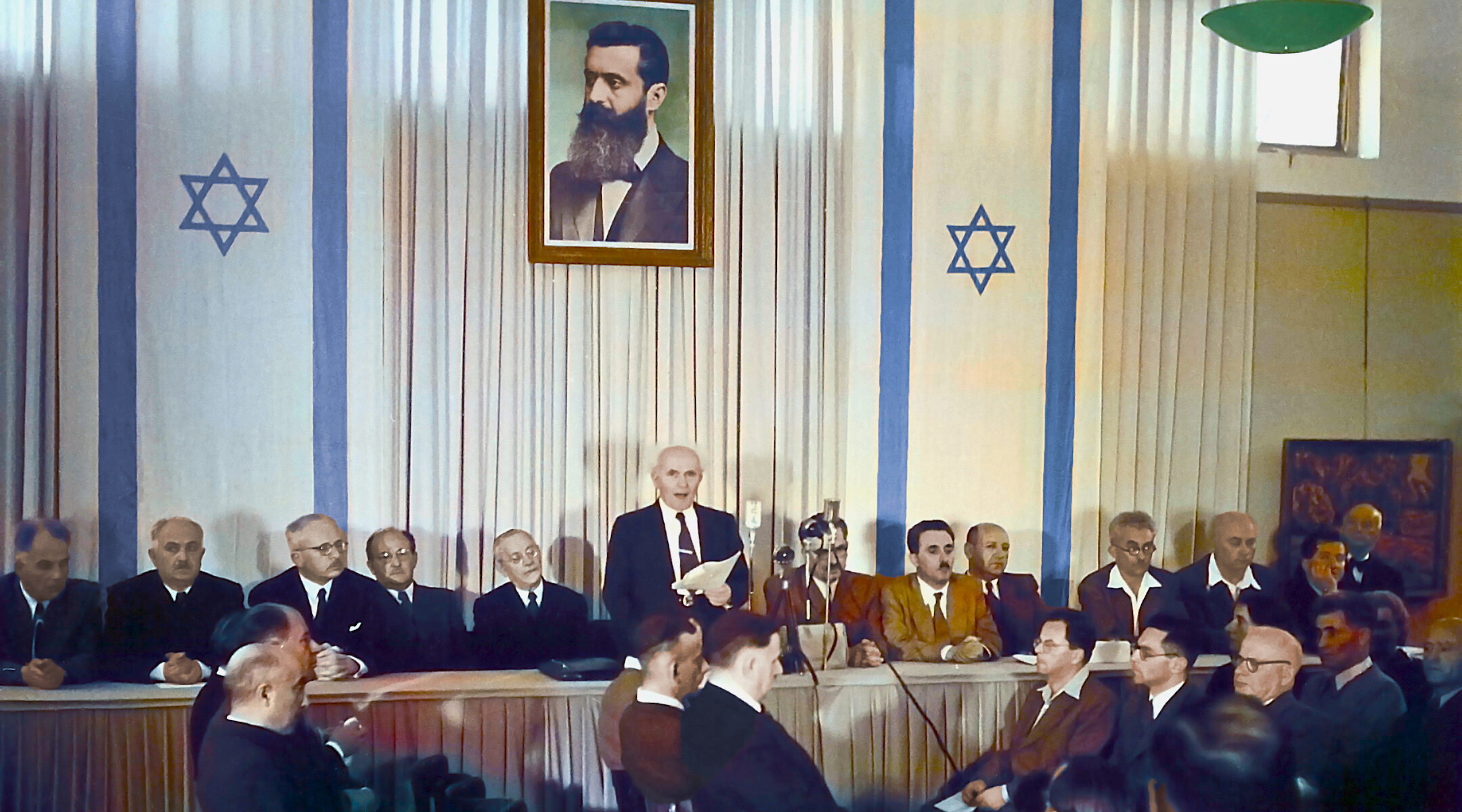(JTA) — This week marks Yom Haatzmaut, our beloved Israel’s 75th birthday — the day on the Hebrew calendar when David Ben-Gurion proclaimed “the natural right of the Jewish people to be masters of their own fate” by establishing a Jewish state in the land of Israel. Together with countless Jews around the world, we express our gratitude to be alive at this moment in history when the Jewish people have sovereignty and a nation to call their own.
But on this anniversary, Yom Haatzmaut’s special prayers and festive afternoon barbecues fail to capture the fraught feelings many of us are experiencing. Jews across the globe in all our different peculiarities and particularities — from all political orientations, religious and secular, progressive and conservative, for and against the judicial overhaul being proposed by the current government — are reeling.
The past few months of terrible turmoil in Israel surrounding the judicial overhaul proposal have shown us how fragile our singular and precious Jewish state is. While Israel’s history is replete with instances when external forces threatened its people, this moment is unique in revealing internal threats to its democracy and social cohesion. We have seen toxic hatred rising among Israeli Jews, with fears of a civil war at an all-time high.
How, then, are we supposed to celebrate Israel on its 75th birthday?
The answer to this question lies at the heart of Jewish history and reveals that now is the moment for a new Zionist revolution led by both Israeli and Diaspora Jews.
Zionism was never just about establishing a Jewish state. It was about defying Jewish history. In 1948, when Ben-Gurion and his fellow Zionist leaders declared Israeli independence, it was nothing less than a radical assault on diasporic Jewish history. It defied the thousands of years of Jews being a minority in other countries, subject to the whims and caprice of other rulers. It defied the image of the weak and defenseless Jew. It even defied Jewish tradition itself, which for centuries was understood by many of its adherents to demand passivity by Jews as they waited for divine deliverance.
For two millennia, Jewish existence was one of vulnerability and victimhood — most often either hiding who we are or suffering for it. The Zionism of 1948 defied diasporic Jewish history by giving Jews power, self-determination and sovereignty to respond to external threats and establish a Jewish state.
Understandably, most of the work of early Zionism was focused on mere survival — establishing a state, providing safe refuge to the millions of Jews fleeing inhospitable lands and contending with enemy countries sworn to destroy the new nation. It succeeded beyond any of the wildest imaginations of its founders. The first 75 years of Israel, in which it has become a powerful and thriving state, are a testament to the success of Zionism in defying diasporic Jewish history.
But the next 75 years of Zionism present and impose on us a different task: To be Zionists today means we must defy a different chapter of Jewish history — one that might be called sovereign Jewish history.
Historians and educators have pointed out a critically important pattern in the history of Jewish self-rule. There are two pre-modern eras in which the Jewish nation enjoyed sovereignty in the land of Israel: at the end of the 11th century BCE with the Davidic Kingdom and the first Temple in Jerusalem, and in 140 BCE when the Hasmonean dynasty reestablished Jewish independence in Judea. But as each approached their 75th year of existence, each started to disintegrate because of internal strife and infighting. The Davidic reign over a united Israel effectively ended when it was split into the two competing kingdoms of Judea and Israel. The Hasmonean kingdom began to fall apart due to infighting between the sons of Alexander and Shlomtzion, the rulers of Judea in the first century BCE.
Sovereign Jewish history tells us that at around the 75th year, experiments in Jewish self-determination faced the most dangerous threat of all: self-destruction.
On its 75th birthday, Israel and its supporters face the internal tensions of sovereignty: What does it mean for Israel to be both a Jewish and democratic state and a home to all its citizens? How can Israel be both at home in the Middle East while modeled on Western democracies? How should its leaders balance majority Jewish culture with minority rights?
The concerns of the old Zionism certainly still exist: how to pursue peace even as Jewish vulnerability and safety continue to be threatened. But they take on a new character in this day and age, forcing us to ask how we can manage and embrace conflicting visions of Jewishness and Israeliness while nurturing social solidarity and cooperation across deep and painful divides.
This Yom Haatzmaut comes at a moment of rupture. But the current crisis in Israel represents an opportunity – a moment for our generation to ensure this rupture defies the pattern of sovereign Jewish history. The generations before us proved that we can rewrite diasporic history, turning a tale of vulnerability and weakness into one of strength and power. Our generation and those that follow must likewise defy sovereign Jewish history and prove that we can protect our Jewish state from the internal threats it faces. Our generation’s task is to overcome our divisions and not let fraternal hatred destroy our shared home.
On this 75th birthday, then, let us learn from our past and look forward toward a new future. Let us continue to celebrate the incredible success by writing a new chapter in the magnificent story of Israel and Zionism.
JTA has documented Jewish history in real-time for over a century. Keep our journalism strong by joining us in supporting independent, award-winning reporting.








